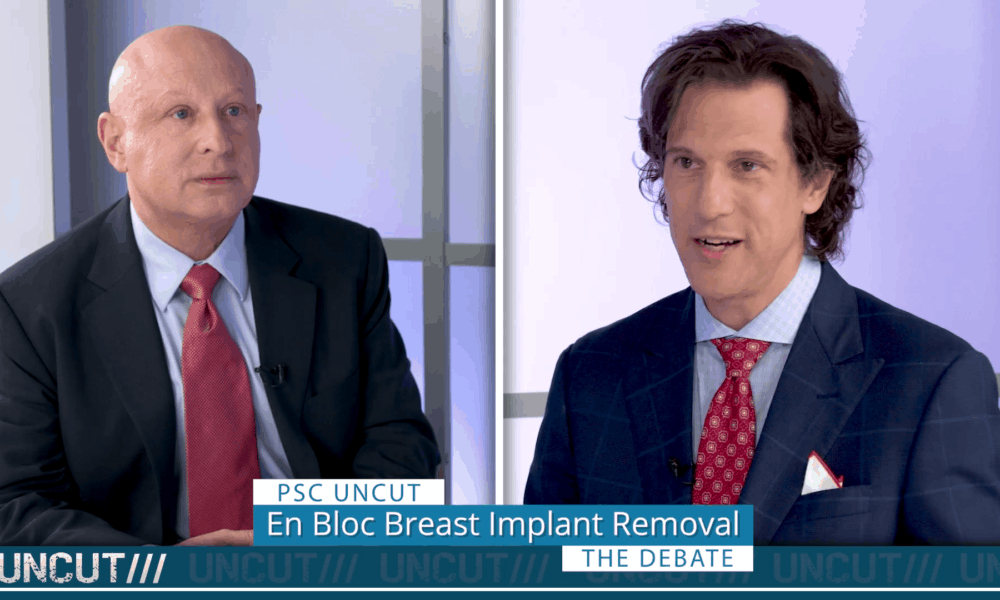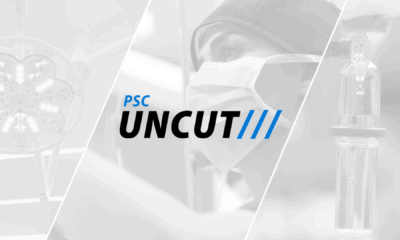
En bloc breast implant removal has garnered a lot of press recently, due to the fact that many online forums on breast implant illness are telling women that they must have their breast implants and surrounding capsule removed en bloc. The problem is that there is a lot of misinformation as to what the procedure entails, if it is actually necessary, and whether or not it is really safe to perform an en bloc removal in your individual case.
Board certified plastic surgeon Dr. Bruce Van Natta of Indianapolis, IN moderates a discussion with his fellow breast surgery experts Dr. Jason Pozner of Boca Raton, FL and Dr. William P. Adams Jr. of Dallas, TX on the ins and outs of an en bloc capsulectomy.
What is an En Bloc Capsulectomy?
Breast Implant Illness is a term that was coined by women in online forums to describe a wide variety of symptoms that they feel are caused by their breast implants. These symptoms include:
- general fatigue
- chest pain
- skin rashes
- hair loss
- headaches
- brain fog
- depression
- anxiety
- hormonal issues
- sleep disorder
These forums recommend that anyone who is suffering from what may be breast implant illness (but which could be something else) have both their breast implants and the fibrous capsule that forms around the implants removed en bloc. A capsulectomy is any procedure to remove the capsule, but an en bloc capsulectomy is when the implant and the capsule are removed as one, whole unit.
En Bloc Capsulectomy Must be Safe
Dr. Pozner has a hard time understanding how these forums came up with this recommendation. In his surgical training, en bloc removal was only performed in surgeries to remove cancer. “You want to get all the cancer and you don’t want to spread the cancer,” he explains. “I have no idea how it got into cosmetic breast surgery.” If he is performing a capsulectomy for capsular contracture, a painful condition in which the capsule around the implant hardens, he will generally do it en bloc, if it’s easy. Many patients don’t understand that, oftentimes, it is impossible to remove the capsule en bloc without causing damage, especially if the scar tissue is close to the lungs.

In situations where an en bloc removal will cause more harm than good, Dr. Pozner has no problem taking out the implant and removing the capsule separately. “I think a lot of people are misinformed,” he shares. Furthermore, due to its increasing popularity, there are a lot of unethical physicians out there who are scam artists. They prey on these potential breast implant illness patients’ fears. Oftentimes, with an en bloc, you need a big cut, “and these poor women are subjected to the big cuts because someone on the internet said you need en bloc recession when the reality is that you are taking out the capsule anyway so it doesn’t matter how you get there,” explains Dr. Pozner.
No Medical Evidence in Support of En Bloc Capsulectomy
Dr. Adams agrees, but also acknowledges that “it’s a very controversial area.” History has proven that anytime that the marketing of a procedure becomes greater than the procedure itself, as is the case with an en bloc removal, it creates potential problems. Furthermore, there is no medical evidence that proves the advantages of an en bloc removal. “It’s really more of a scheme to get patients to come in,” explains Dr. Adams.
It’s important for patients to understand that there is no scientific evidence that an en bloc removal is better than any other type of capsulectomy, such as a precise capsulectomy, what most plastic surgeons perform. “Furthermore, there’s absolutely no scientific evidence right now to show that taking out the capsule itself has any benefit to any patient who may be thinking that their breast implants are causing them a problem,” explains Adams.
Why Patients Driving the Bus is Problematic
One of the fundamental problems with breast implant illness websites is that “the patients are driving the bus,” says Dr. Van Natta. When Dr. Pozner sees a patient who thinks that her implants may be making her sick, his first rule of thumb is to rule out any other medical issues. Does the patient have a thyroid problem? Could it be a hormonal issue? Is there some form of autoimmune disease present? It is vital that plastic surgeons first try to get to the root of the problem. Plastic surgeons are, after all, physicians first.

Dr. Adams agrees that plastic surgeons must be really careful not to misinterpret things. He has heard surgeons say, ‘Well, I want to do what my patient wants.’ “If your patient comes in saying, ‘I want you to take out my eye because it’s hurting,’ no surgeon is going to do that because it’s ridiculous,” he says. An en block capsulectomy for potential breast implant illness falls into a very similar category. “We want to do what our patients want to do, but we also have to be advocates for our patients and educate them,” explains Dr. Adams.
This means not doing a procedure that is unproven or could potentially be harmful. It’s vital for patients to do their homework and have a lengthy conversation with a board certified plastic surgeon who specializes in breast surgery before considering an en bloc implant removal.










Facebook
Twitter
Instagram
YouTube
RSS